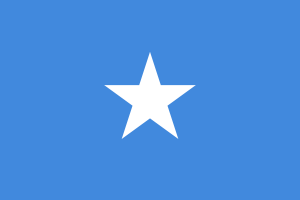Language/Somali/Grammar/Adjective-Agreement
| ◀️ Noun Gender and Plurals — Previous Lesson | Next Lesson — Family Members ▶️ |
Welcome to today's lesson on Adjective Agreement in the Somali language! Understanding how adjectives agree with the nouns they modify is crucial for forming correct sentences in Somali. Adjectives in Somali are not just descriptive words; they play a vital role in conveying the proper meaning and context of a sentence. In this lesson, we will explore the rules of adjective agreement, focusing on how adjectives must match the gender and number of the nouns they describe.
Before we dive into the details, let’s outline what you can expect from this lesson:
What is Adjective Agreement?[edit | edit source]
In Somali, adjectives must agree with the nouns they describe in two key areas: gender and number. This means that if a noun is feminine, the adjective must also be in a feminine form; if the noun is plural, the adjective must reflect that pluralization too.
Somali nouns are categorized into two genders: masculine and feminine. Most nouns in Somali have a specific gender, and this gender affects the form of accompanying adjectives.
Gender of Adjectives[edit | edit source]
In Somali, adjectives usually take on different forms depending on whether they are describing a masculine or feminine noun. Here are the most common endings for adjectives based on gender:
- Masculine Adjectives: Usually end in a consonant or ‘-a’
- Feminine Adjectives: Typically end in ‘-ad’ or ‘-e’
To illustrate this, let’s look at some examples:
| Somali | Pronunciation | English |
|---|---|---|
| buug weyn | buʊɡ wejn | big book |
| buug weyn | buʊɡ wejn | big book |
| guri weyn | ɡuɾi wejn | big house |
| guri weyn | ɡuɾi wejn | big house |
| madaxweyne fiican | mədʊxənɪ fiːʕan | good president |
| madaxweyne fiican | mədʊxənɪ fiːʕan | good president |
Here, buug (book) is masculine, and guri (house) is feminine. The adjective weyn (big) agrees with both nouns, maintaining the masculine form for buug and feminine for guri.
Number Agreement[edit | edit source]
In addition to gender, adjectives must also agree with the number of the nouns they modify. In Somali, nouns can be singular or plural, and adjectives will change accordingly.
- Singular Adjectives: These correspond to a single noun.
- Plural Adjectives: These are used when referring to multiple nouns.
Let’s take a look at a few examples of singular and plural forms:
| Somali | Pronunciation | English |
|---|---|---|
| cunto macaan | kun.to maʕaːn | delicious food |
| cuntooyin macaan | kun.to.jʊn maʕaːn | delicious foods |
| guri cusub | ɡuɾi tʃʊsʊb | new house |
| guryo cusub | ɡuɾjʊ tʃʊsʊb | new houses |
| caruur faraxsan | kaɾuːɾ faɾax.san | happy children |
| caruur faraxsan | kaɾuːɾ faɾax.san | happy children |
In these examples, cunto (food) is singular while cuntooyin (foods) is plural. Notice how the adjective macaan (delicious) remains the same in both cases, demonstrating that not all adjectives change form when moving between singular and plural.
Applying What You've Learned[edit | edit source]
To help you solidify your understanding of adjective agreement, we will now go through some exercises.
Exercises[edit | edit source]
1. Identify the Gender: Determine the gender of the following nouns and write the correct form of the adjective weyn (big).
- a. guri (house)
- b. buug (book)
- c. cunto (food)
2. Plural Forms: Convert the following sentences into plural forms and ensure the adjectives agree.
- a. guri cusub (new house)
- b. madaxweyne fiican (good president)
3. Fill in the Blanks: Choose the correct form of the adjective based on the gender and number of the noun.
- a. caruur ________ (faraxsan) (happy children)
- b. buug ________ (wacan) (good book)
4. Create Sentences: Write three sentences using the adjective fudud (easy) with both masculine and feminine nouns in singular and plural forms.
5. Translate the Sentences: Translate the following sentences into Somali, ensuring proper adjective agreement.
- a. The big house is beautiful.
- b. The small books are interesting.
Answers and Explanations[edit | edit source]
1.
- a. guri weyn (big house) - Feminine
- b. buug weyn (big book) - Masculine
- c. cunto weyn (big food) - Feminine
2.
- a. guryo cusub (new houses)
- b. madaxwaynayaal fiican (good presidents)
3.
- a. caruur faraxsan (happy children)
- b. buug wacan (good book)
4.
Example Sentences:
- buug fudud (easy book) - Masculine Singular
- guri fudud (easy house) - Feminine Singular
- buugaag fudud (easy books) - Masculine Plural
5.
- a. guri weyn waa qurux badan (The big house is beautiful).
- b. buugaag yaryar waa xiiso leh (The small books are interesting).
By completing these exercises, you will have practiced identifying and using adjectives in Somali, ensuring you understand their agreement with nouns in terms of gender and number.
Remember, mastering adjective agreement is a key step in your journey to fluency in Somali. Keep practicing, and don't hesitate to refer back to this lesson whenever you need a refresher!
Videos[edit | edit source]
Somali Grammar 3.4 Are Somali adjectives inflected? - YouTube[edit | edit source]
Sources[edit | edit source]
Other Lessons[edit | edit source]
- Future Tense
- Nouns
- Common Adverbs
- Basic Verb Conjugation
- Noun Gender and Plurals
- How to Use Be
- Possession
- Conditional Mood
- Adjectives
| ◀️ Noun Gender and Plurals — Previous Lesson | Next Lesson — Family Members ▶️ |

